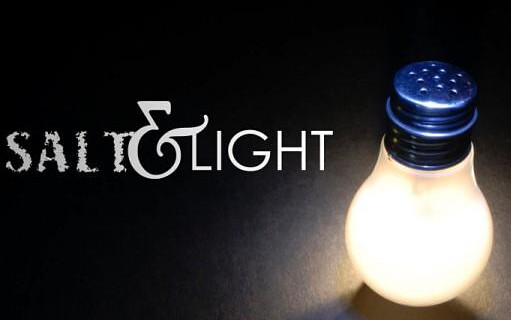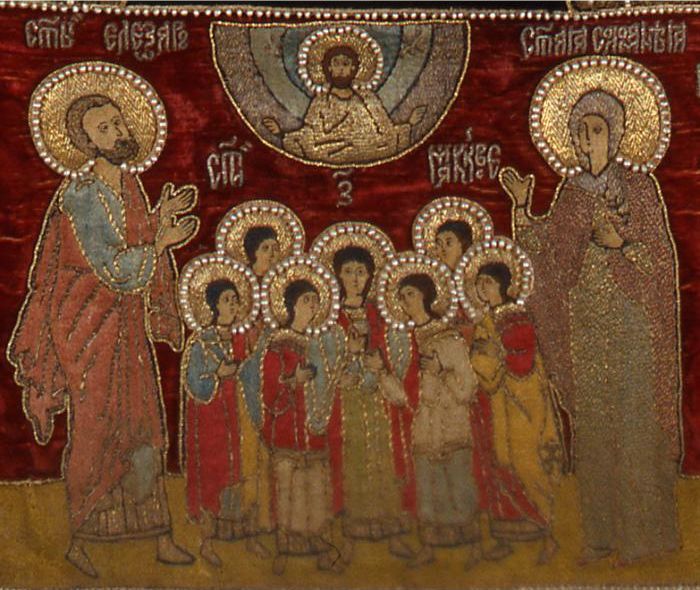One of the most basic spiritual principles is that the Christian life looks like something. The Christian looks like something. Perhaps we ought to change that to “looks like someone,” that someone of course being Jesus Christ.
In the Liturgy of the Hours, which clergy and others pray each day, today there is a reading from a section of Gaudium et spes, the Pastoral Constituition on the Church in the Modern World from Vatican II. The line that jumped out at me was this one: “Man’s worth is greater because of what he is than because of what he has.” So the Christian doesn’t look like her or his possessions; doesn’t look like what he does, but rather what he is. And what she or he is is what Jesus is getting at in today’s Gospel reading.
Jesus gives us the images of salt and light, and I think those are very familiar images for us to grasp. We all use salt and light every day, and it is interesting to hear Jesus say that that is what we are. Anyone who cooks, or even anyone who eats, will tell you of the value of salt. I like to watch the television show Chopped on the Food Network. On that show, four chefs compete to make something edible of a basket of disparate and perhaps even bizarre ingredients. Then three judges sample their dishes and decide who is not moving on to the next round; they are “chopped.” At the end, one of them wins a bunch of money. I can’t tell you how many people I’ve seen on that show get “chopped” because they under-seasoned their food. A pinch of salt might be what got between them and ten thousand dollars!
So the Christian is salt for the world; we are called to season the world with joy and goodness and concern for the poor and genuine love, based on the Gospel. But Jesus wonders what would happen if that salt were to lose its flavor. Now I can’t imagine salt losing its saltiness. In fact, I googled this one time and found a chemist who took this question on. He indicated that salt, in its crystalline form, is pretty stable; it doesn’t lose its flavor. So Jesus was using, as he often does, hyperbole to get our attention. Suppose for the moment that salt could lose its saltiness: what would it then be good for? Well, nothing, of course.
But Jesus seems to be saying that we, as the salt for the world, could lose our saltiness. For example, we could become under-seasoned by skipping Mass to attend a sports event or sleep in. We could become under-seasoned by neglecting our prayer life. We could become under-seasoned by watching the wrong things on TV or surfing the wrong sites on the internet. We could become under-seasoned by holding on to relationships that are sinful. And when that starts to happen, our ability to season our world with the presence of Christ is diminished, little by little. Our salt loses its saltiness.
And then we have the image of light. When I preach this text for children, I often ask them how many of them are or ever had been afraid of the dark. Lots of hands go up, as you can well imagine. I think that’s probably true of all of us on some level; the darkness is a scary place. There are all sorts of obstacles in the dark that could cause us to trip and fall, and you never know what might befall you on a dark and scary road. All of us have had those experiences when we are in the dark, and it’s not a fun place to be.
So what do you do when you find yourself in the dark? Well, you turn on the light, of course. The light changes everything: you can see the obstacles over which you might have fallen. Anything lurking in the dark will now be identified in the light. Sometimes a quick look around with the lights on will assure you that that noise you heard was just the house settling, or the furnace firing up, or something similarly innocuous. The light just makes you feel a little safer.
And so we are called to be light too. We don’t need much time to think about how dark our world can be at times. We see on television the news about war and crime and terrorism and new diseases and things we shouldn’t be eating. We hear about children bullying one another and people stalking others on the internet. A quick moment of reflection reminds us of our own sinfulness; the bad that we have done and the good we have failed to do. Darkness in our world can be pretty pervasive at times, and it makes the world a rather frightening place.
But we have the light. We’ve been exposed to the light. We have come alive in Jesus, the Light of the world – that’s what we celebrated last weekend during our feast of the Presentation of the Lord. As those gifted with the Light of the world, we become people of light. We become light for the world too. Jesus insists that our light should shine so brightly that we affect the darkness of our world, completely overcoming that darkness with the Light of Christ. He insists that we are now that city, set on a hill, that cannot be hidden.
St. Therese of Liseaux used to talk about doing little things with great love for the glory of God. She found joy in her “Little Way” and it has inspired so many people ever since. Our Liturgy today calls us to do little things and big things, all for God’s glory. It calls us to be salt for a world grown bland with despair and light for a world dwelling in a very dark place. In our first reading, the prophet Isaiah tells us how to do it:
Share your bread with the hungry,
shelter the oppressed and the homeless;
clothe the naked when you see them,
and do not turn your back on your own.
Then your light shall break forth like the dawn…
If neglecting our prayer life and our integrity causes us to lose our saltiness, if giving in to shame and despair puts out our light, then we can never do what we were created for. But we have been given salt and light to season and light our world. We are the city set on the hill for all the watching world to see. Would that they might see us doing little things and big things, all for the glory of God.



You must be logged in to post a comment.